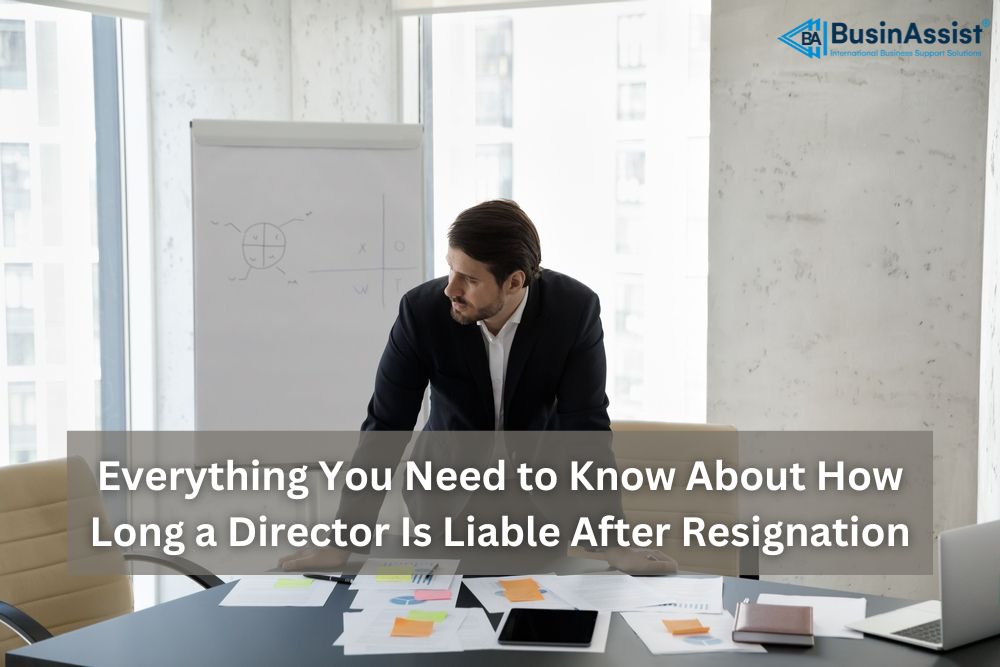Last Updated on December 18, 2025 by Joy Kyalo

UK company formation for just £0.99 and get your UK virtual office address for only £0.88 – available for both UK and non-UK residents!
Resigning as a limited company director is a straightforward process, however, one would assume that they will not be subjected to the company’s obligations. This may be true, but there are circumstances where a director is liable after resignation.
A limited company strictly provides limited liability to directors and shareholders, however, they become liable for wrongful trading, misfeasance, or even breach of fiduciary duties. A director of a company is liable to compensate the company for any loss suffered during their tenure.
How long is a director liable after resignation? As we explore the period where a director remains liable after stepping down, we must understand what we mean by the word “liable”.
Key Takeaways
- A director may still be liable for wrongful trading, fraud, or breaches of duty committed while in office, even after resignation.
- Personal guarantees on company loans remain binding, so liability can continue regardless of resignation.
- Liability timeframes vary, directors may be accountable for misconduct up to three years before insolvency, or indefinitely in certain cases.
What is liability?
Liability is a term used to refer to an obligation or accountability that an individual or a business owes to another party. Liabilities include expenses accrued, loans, credit card bills, mortgages, bonds, rent, warranties, and many others depending on where you are using them.
Limited companies offer limited liability to their directors and shareholders. This means that the members of a limited company, that is, shareholders, investors, and directors cannot be held responsible for the companies’ debts.
A limited company is a separate legal entity meaning it can take loans, buy assets, purchase equipment, and own rental properties. In case a company defaults on a loan, it can use its assets to pay it off.
What is the director’s liability in a limited company?

As much as a limited company offers limited liability to directors, there are circumstances where there are exemptions that can make them personally liable. A director can be held liable for the company’s debts, taxes, and losses.
A director may be liable for the company’s debt if they allow an insolvent company to trade. Insolvent companies should not be allowed to trade. Directors can also be personally liable for a company’s debts if they provide personal guarantees on behalf of the company.
Directors are prohibited from participating in illegal trading activities. If they are caught trading fraudulently, they will be in breach of the director’s duties and can be held liable.
Additionally, directors may be liable if the company doesn’t meet its tax and statutory documents obligations. Directors have the responsibility of filing statutory documents and taxes which are annual accounts, confirmation statements, corporation tax, and VAT tax. Directors can hire an accountant to fulfill those responsibilities on their behalf, however, if they fail to meet Companies House requirements, the director will be held liable.
Can a director of a limited company resign?
Tending a resignation letter as a limited company director is a straightforward process as long as they provide proper notice to the company. However, directors need to read and understand the Articles of Association or a director’s service agreement to see if there are any contrary provisions against how a director should resign.
To resign as a director, you have to notify the company in writing of your decision, and once served, it may not be withdrawn without the company’s consent even if the decision may damage the company’s reputation or business activities. Stipulated roles and responsibilities of a director do not affect their decision to resign.
To resign as a director, you should;
- Inform other directors that you intend to resign and serve any notice period required according to the employment contract
- File form TM01 with Companies House whether online or by post. Make sure to include the company and registration number, your full name and date of birth, and the effective date of your resignation within 14 days of the resignation’s effective date.
- Inform clients and stakeholders that you are resigning and provide new contact details if needed.
- Check the governing documents to see if it specifies whether you can keep your shares after resigning
If you are the sole director, ensure there is a director in place before you resign. You’ll need to provide your replacement to Companies House before your exit. However, it is the company that will be in breach of sections 154 and 155 of the Companies Act 2006 if it is left with no directors. Shareholders may be directed by the Secretary of State (via Companies House) to appoint at least one director as per the Act.
How long is a director liable after resigning?
The time frame a director is liable after resigning might differ. If a director provides a personal guarantee on the company’s loan, there is no fixed period after which the director resigns.
If a director committed financial misconduct that led to the insolvency of the company after their resignation, they may be liable at any point in the three years before the company’s financial collapse.
There are circumstances where a director can be held liable indefinitely for past actions depending on the legal action.
So, how long is a director liable after resignation? This will vary depending on different circumstances. A director will be held liable for a fixed period and others indefinitely. It is important for director to not breach their responsibilities while in tenure to make it easy for them to resign and not be accountable for the company after stepping down.
Looking for someone to help in filing your company’s statutory documents? Look no further. BusinAssist offers company services such as confirmation statement filing and company annual accounts filing. As a company director, you may have a lot of responsibilities and forget to file statutory documents. Avoid penalties and fines, and let us help you make sure your statutory documents are filed on time and accurately.
For more information, contact us at info@businassisit.com.
FAQs
Q: How do you resign as a company director?
Ans: To resign as a director, you will need to;
- Notify other directors of your intention to resign.
- Submit a written resignation letter that includes the effective date and other relevant details.
- Notify Companies House by filing form TM01 online or by post within 14 days of the resignation’s effective date.
- Inform clients and stakeholders that you are resigning and give them new contact details if needed.
- If you are the sole director, make sure you have a replacement.
Q: How to notify Companies House of the resignation of the director?
Ans: To notify Companies House of a director’s resignation, the company must submit form TM01 within 14 days of the resignation’s effective date. To fill out the form, the company will use Companies House WebFiling system. You’ll need the company’s registration number and the resigning director’s personal details. The company is responsible for submitting the form, not the resigning director. The form may be rejected if the resigning director submits it.
Q: When does your resignation as a director become effective?
Ans: A director’s resignation becomes effective on the date the company receives the resignation notice or on a later date specified in the notice. It can also become effective according to the employment contract.
Q: What is the procedure for the resignation of the director?
Ans: The procedure for a director to resign is;
- Check your contract to see if it requires a notice promise.
- To write a resignation letter to convey your intention to resign. The letter should be brief, positive, and professional.
- The company should notify Companies House by filling and submitting Form TM01.
- Inform customers, suppliers, and partners that you are resigning and provide contact details if needed.
Read Also:
- What Happens to Directors When a Company is Dissolved?
- A Step-by-Step Guide to Resign as a Director of a Limited Company
- Understanding Who Is Liable for Debts in a Limited Company: Key Points for Business Owners
- Company Pension Contributions for Directors: A Comprehensive Guide to Planning for Retirement
- Can HMRC Access Your Bank Account? What Every Taxpayer Should Know
- What is a Tax Office Reference Number and How Can I Find It?
- How to Change Your SIC Code on Companies House: A Step-by-Step Guide for UK Businesses
- Lost Your Government Gateway User ID and Password? Here’s How to Find Them
- Can a Company Be a Director of Another Company: Legal Insights for 2025
- TM01 Form: Removing a Director – Everything You Need to Know

Joy is a content writer at BusinAssist with 6+ years of experience in content marketing and social media strategy. She specialises in company formation and virtual operations, guiding entrepreneurs through global markets with clarity, drawing on her marketing and PR background. Business Assist with BusinAssist – your business success partner.